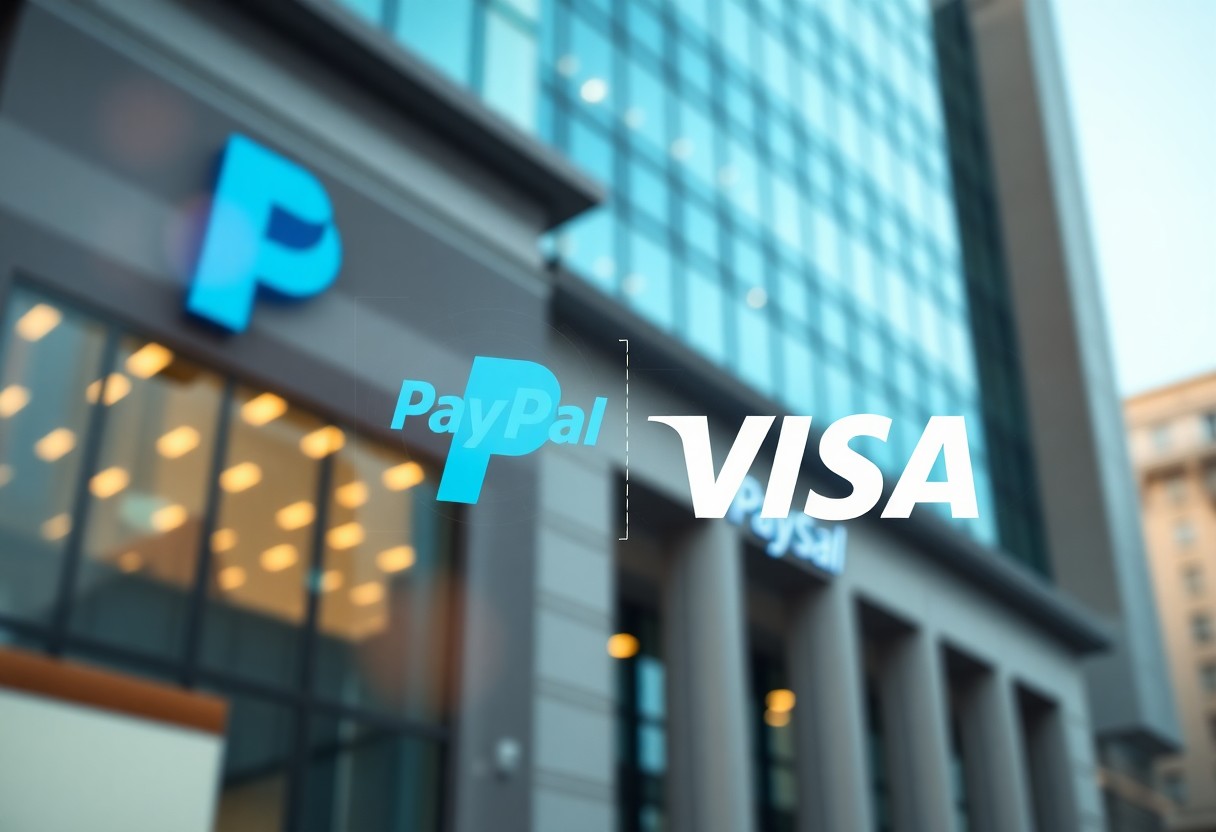Now Reading: PayPal and Visa Expand Blockchain Initiatives Amidst Traditional Banking Challenges
-
01
PayPal and Visa Expand Blockchain Initiatives Amidst Traditional Banking Challenges
PayPal and Visa Expand Blockchain Initiatives Amidst Traditional Banking Challenges

With significant shifts occurring in the financial landscape, you may find it imperative to understand how PayPal and Visa are advancing their blockchain initiatives in response to the struggles faced by traditional banking systems. As digital payments gain momentum, these industry giants are exploring innovative solutions to enhance security, efficiency, and user experience. This evolution not only reflects the challenges banks are encountering but also highlights the growing acceptance of blockchain technology as a viable alternative. Staying informed about these developments can empower you to navigate the changing financial environment more effectively.
Key Takeaways:
- PayPal and Visa are enhancing their blockchain initiatives as they seek to address the limitations and challenges faced by traditional banking systems.
- The move reflects a growing trend among financial technology firms to leverage blockchain for improved transaction efficiencies and enhanced security.
- This expansion may indicate a shift in competitive dynamics between established banks and fintech companies, potentially leading to greater innovation in the payments industry.
The Growing Role of Blockchain in Financial Services
Before the rise of blockchain technology, financial services predominantly relied on traditional banking systems, characterized by slow processing times and high fees. Today, blockchain introduces a decentralized approach that enhances transaction speed and security while reducing costs. As you explore this shift, you’ll find that blockchain not only streamlines operations but also offers transparent record-keeping, paving the way for innovation in payment networks and beyond.
Evolution of Blockchain Adoption
For financial institutions, the journey towards blockchain adoption has been gradual but impactful. Initial skepticism has given way to a growing recognition of its transformative potential. You may notice that more banks and payment service providers are now piloting blockchain projects to enhance their service offerings and stay competitive in the rapidly changing financial landscape.
Key Benefits for Payment Networks
Between traditional payment methods and blockchain solutions lies a gap filled with inefficiencies that blockchain seeks to address. You can leverage the advantages of speed, lower costs, and improved transparency, which are significant motivators driving this shift in payment networks. These benefits not only enhance the customer experience but also support stronger security measures.
In fact, the implementation of blockchain technology can dramatically reduce transaction processing times from days to mere seconds. Additionally, you can benefit from lower operational costs as blockchain eliminates the need for intermediaries, making transactions more efficient. Importantly, the transparency that comes with blockchain allows for real-time tracking of transactions, which can enhance trust and compliance in your operations. These factors combine to create a more resilient payment network that can adapt to the evolving demands of your customers and the market at large.
PayPal’s Blockchain Strategy
Clearly, PayPal is leveraging blockchain technology to enhance its services and address the shifting landscape of digital finance. As discussed in The Impact of Blockchain on Traditional Banking, this strategy not only improves transaction speed but also offers increased security and transparency for users.
Recent Initiatives and Developments
Behind the scenes, PayPal has been actively exploring partnerships with blockchain firms and integrating crypto services into its platform, aiming to pave the way for the widespread adoption of digital currencies.
Impact on Digital Payments
By adopting blockchain technology, PayPal is transforming your experience with digital payments, facilitating faster transactions that can occur outside traditional banking hours.
Due to this innovative approach, PayPal is setting a new standard in digital payments. The implications of their blockchain strategy are significant, as you can expect quicker transaction times and lower fees while maintaining high security. As a result, you may feel more confident engaging in online transactions, knowing that your financial data is protected. With these advancements, PayPal not only enhances user experience but also positions itself as a leader in the evolving landscape of digital finance.
Visa’s Expansion into Blockchain
Despite the challenges faced by traditional banking, Visa Introduces the Visa Tokenized Asset Platform, demonstrating its commitment to leveraging blockchain technology. This initiative aims to enhance transaction security and streamline payment processes, allowing you to engage with digital assets more efficiently. As Visa continues to expand its blockchain initiatives, you can expect innovative solutions that cater to both consumers and businesses.
Partnerships and Innovation
Visas are making strategic partnerships with blockchain firms, enabling the development of advanced payment solutions. These collaborations are vital as they aim to create an ecosystem that enhances user experience and security. By aligning with pioneering blockchain innovators, Visa ensures that you have access to cutting-edge technology in your transactions.
Competitive Positioning in the Industry
Blockchain technology is rapidly transforming the financial landscape, and Visa is positioning itself to remain a leader. By integrating blockchain into its operations, Visa enhances transaction speed and reduces costs. Your ability to conduct secure and swift transactions is significantly bolstered as Visa announces new features to comply with evolving regulatory standards. In fact, this proactive approach allows you to navigate the digital payment space with increased confidence. With a strong focus on innovation and partner synergy, Visa is set to maintain a stronghold in a competitive market.
Challenges Facing Traditional Banking
Keep in mind that traditional banking institutions are grappling with multiple challenges that threaten their long-standing dominance. Outdated technologies, high operational costs, and inefficient processes often hinder their ability to adapt swiftly to the changing financial landscape. Furthermore, customer distrust due to past financial crises has intensified the urgency for banks to innovate and enhance customer experiences in order to remain relevant in the modern economy.
Regulatory and Technological Barriers
Barriers such as stringent regulations and outdated technological infrastructures pose significant obstacles for traditional banking institutions. Compliance with evolving regulations can be both time-intensive and costly, further constraining innovation. Additionally, many banks face challenges in integrating new technologies that are vital for competing in today’s dynamic financial environment.
Competition from Fintech and Blockchain Firms
Challenges arise as fintech companies and blockchain firms disrupt the traditional banking model. Their ability to offer lower fees, faster transactions, and enhanced user experiences attracts customers seeking alternatives. With the implementation of innovative solutions, these companies are not only redefining financial products but also raising customer expectations, forcing traditional banks to reevaluate their strategies to retain clientele.
Firms in the fintech and blockchain sectors are at the forefront of revolutionizing the financial landscape. They provide flexible services such as peer-to-peer lending, digital wallets, and decentralized finance solutions that appeal directly to consumers who desire greater autonomy and efficiency. This heightened competition pushes traditional banks to leverage advanced technologies, streamline their services, and enhance customer engagement strategies to prevent losing market share. Your ability to understand these shifts can position you advantageously in navigating the evolving financial environment.
The Future of Blockchain in Finance
Unlike traditional banking systems, blockchain technology promises to enhance transparency, efficiency, and security in financial transactions. As you navigate this evolving landscape, it’s important to recognize how decentralized systems could reshape payment processes, asset management, and compliance measures. The future holds the potential for a financial ecosystem where trust is embedded in the technology itself, simplifying your interactions and reducing reliance on intermediaries.
Trends and Potential Growth Areas
On the horizon, several trends are emerging within the blockchain space. You may find developments in decentralized finance (DeFi), which aim to democratize access to financial services, and increased adoption of stablecoins as a means of transferring value with reduced volatility. Additionally, institutional investment in blockchain projects signals a growing acceptance of this technology, creating opportunities for innovative solutions to emerge.
Implications for Consumers and Businesses
Areas where blockchain can significantly impact you include enhanced payment efficiency, reduced transaction costs, and greater data security. As businesses explore these benefits, you may experience quicker settlements and lower fees for services. Moreover, the ability to track and verify transactions on a public ledger can foster trust and accountability, ultimately improving your experience.
With the rise of blockchain technology, your interactions with businesses could become more seamless and transparent. The shift towards decentralized solutions means that you may enjoy faster transactions and lower costs as established financial institutions adapt to incorporate blockchain innovations. Furthermore, as data security improves, your sensitive information will be better protected, potentially reducing the risks associated with fraud and data breaches. Embracing these changes can position you and your business for future success in an increasingly digital financial landscape.
Final Words
To wrap up, you can see how PayPal and Visa are navigating the complexities of the evolving financial landscape by investing in blockchain technologies. Their initiatives reflect a strategic response to the challenges faced by traditional banks, offering you alternatives that could redefine how you manage transactions. As these companies continue to innovate, staying informed on their developments can empower you to make better financial decisions in this rapidly changing environment.
FAQ
Q: What does the expansion of PayPal and Visa into blockchain initiatives mean for traditional banking?
A: The expansion of PayPal and Visa into blockchain initiatives signifies a shift towards a more decentralized financial infrastructure. Traditional banking has faced challenges such as slow transaction speeds and high fees, and the adoption of blockchain technology by these major players can provide solutions. By leveraging blockchain, they can offer more efficient transaction processing, lower costs, and enhanced security, ultimately aiming to better meet consumer demands and compete more effectively with emerging fintech companies.
Q: How are PayPal and Visa utilizing blockchain technology?
A: PayPal and Visa are integrating blockchain technology in various ways to enhance their services. For instance, PayPal has introduced features that allow users to buy, hold, and sell cryptocurrencies directly through their platform. Visa, on the other hand, is working on projects that facilitate cross-border payments and settlement processes using blockchain, aiming to streamline transactions and provide faster service. Both companies are exploring smart contracts and decentralized finance (DeFi) applications to broaden their offerings in the financial ecosystem.
Q: What potential benefits do consumers gain from these blockchain initiatives by PayPal and Visa?
A: Consumers can expect several benefits from the blockchain initiatives launched by PayPal and Visa. First, transactions are likely to be processed faster, which can improve the overall user experience. Additionally, the implementation of blockchain can lead to reduced fees, making digital payments more affordable. Moreover, enhanced security features associated with blockchain technology can provide users with increased confidence in the safety of their transactions. As these companies innovate, consumers might also gain access to new financial products and services leveraging blockchain, such as digital wallets and instant payment processing.























